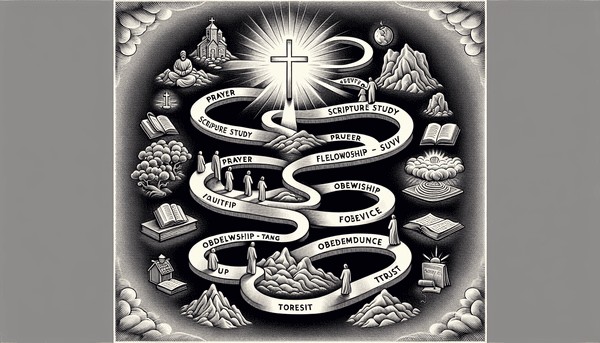Friendships Across Different Faiths
Our journey through life inevitably intersects with individuals who hold different beliefs and convictions. While 1 Corinthians 5:9-10 warns against partaking in the sins of others, it also acknowledges the practicality of engaging with a diverse range of people in the world. It's a delicate balance, where discernment becomes key to maintaining one's faith without isolation. Echoing this sentiment, 2 Corinthians 6:14 advises caution in forming close bonds with unbelievers, to avoid being 'unequally yoked' in ways that might compromise one's spiritual journey. Yet, the central message from Jesus is one of universal love and kindness, as exemplified in Luke 6:35, urging us to extend compassion to all, including our enemies. Through these scriptures, we are reminded that we can form meaningful friendships across different faiths, as long as we remain vigilant about the influence these relationships have on our own spiritual lives.
Friendships with the Opposite Gender
Scripture does not shy away from addressing the complexities of cross-gender relationships. While specific verses don't outline the exact nature of these friendships, the values of love, respect, and purity are consistently emphasized. The life of Jesus provides a profound example, as seen in His respectful conversation with the Samaritan woman at the well (John 4:7-26). Similarly, in the early church, Paul's greetings to contributors like Phoebe and Priscilla in Romans 16 illustrate men and women working together in harmony. However, caution is also urged, as in 1 Thessalonians 5:22, which instructs us to 'abstain from all appearance of evil,' encouraging mindfulness in our relationships. Through this guidance, we learn that friendships with the opposite gender can be maintained with godly integrity and respect, ensuring that our conduct remains above reproach.
Understanding God's Timing and Trusting Him
Patience is often said to be a virtue, but it is in the waiting that we truly learn to trust in God's timing. The anticipation of God's perfect plan can be challenging, yet the Scriptures offer words of wisdom and comfort. Isaiah 40:31 reassures us that those who wait on the Lord will renew their strength, soaring like eagles. Similarly, Romans 8:28 reminds us that God works all things for the good of those who love Him. Trust is not a passive state; it is active reliance on God as Proverbs 3:5-6 encourages us to lean not on our own understanding but to acknowledge Him in all our ways. In embracing this divine timing, we not only grow in faith but also come to witness His faithfulness and perfect orchestration in our lives.
The Essence of Happiness in Christian Life
Happiness in Christian life is a profound joy that stems from a deep relationship with God, rather than transient pleasures or circumstances. This joy is a blessing from God, as seen in Psalm 144:15 which speaks of the happiness of the people whose God is the Lord. Philippians 4:4 echoes this sentiment, urging believers to rejoice in the Lord always. The assurance of God's unwavering love is a cornerstone of this happiness, as expressed in John 3:16 and Romans 8:38-39, which assure us that nothing can separate us from His love. True happiness is found in the pursuit of a life aligned with God's will, finding contentment in His promises and engaging in spiritual practices that foster a deep sense of joy and peace.
Conclusion
As we navigate the complexities of relationships and life's uncertainties, the Scriptures offer invaluable guidance for living a life rooted in faith. Our interactions with those of different beliefs or the opposite gender can reflect the love and wisdom that comes from a Christ-centered life. Understanding and embracing God's timing, recognizing the potential blessings in our struggles, and seeking happiness through our relationship with God are all integral to a fulfilling Christian journey. May we apply this biblical wisdom to our daily lives, finding solace and strength in the word of God, and may our actions always point back to the love and grace that is the hallmark of our faith.
FAQ
Q: Should you have friends that are not of the same faith?
A: Yes, you can have friends of different faiths. Scripture teaches us to love and interact with a diverse range of people while maintaining discernment regarding the influence these relationships have on our faith (1 Corinthians 5:9-10; Luke 6:35).
Q: Should you be friends with the opposite gender?
A: Friendship with the opposite gender is not prohibited in Scripture. The key is to ensure that these relationships are based on the principles of love, respect, and purity, and that they are conducted with integrity (John 4:7-26; 1 Thessalonians 5:22).
Q: What does it mean that the heart of the wise seeks understanding?
A: Seeking understanding is a sign of wisdom. It involves a desire to gain deeper insight and knowledge, particularly in matters of faith and life, reflecting a humble and teachable spirit (Proverbs 18:15).
Q: How do you initiate your quest for understanding?
A: To initiate your quest for understanding, begin with prayer, study Scripture, seek counsel from wise and godly individuals, and be open to learning from various life experiences (James 1:5).






